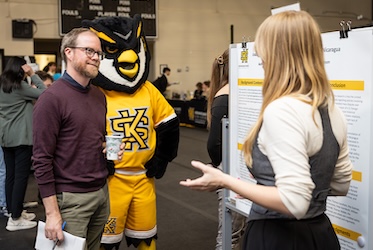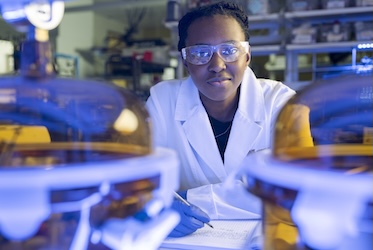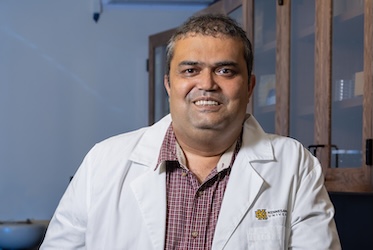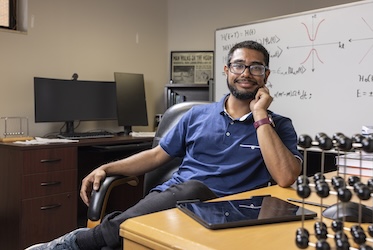
Kennesaw State playing role in making super-fast quantum computing a reality
KENNESAW, Ga. | Oct 23, 2023

To help build and equip his laboratory, Wen has received a $796,000 grant from the National Science Foundation to expand study of the physics of quantum computing, making KSU one of 22 universities receiving funds through the NSF’s $38 million ExpandQISE (Expand Quantum Information Science and Engineering) initiative.
“This grant brings the opportunity for our students to engage with the forefront of research in quantum information, and that starts with quantum technology,” said Wen, who teaches physics in KSU’s College of Science and Mathematics. “I also hope to discuss the addition of courses in quantum information with the curriculum committee, because this will make Kennesaw State an attractive destination for students who want to study this exciting field.”
Quantum computing uses subatomic particles to carry and process information far faster than any computers in use now. An obstacle to creating a functioning quantum computing system is that the stability of the particles is easily upset by interference within the computer. The challenge for Wen and other participants in the ExpandQISE initiative is to create stable particles, called qubits, to be the basic building blocks of quantum information processing.
The field of quantum computing has a long way to go, but Wen predicted there will be functioning quantum computing systems within a decade. The primary application for quantum computing will be in defense. With the ability to perform billions of calculations per second, a quantum computer could make missile defense systems far more effective than today, Wen said.
The field of quantum mechanics goes back to 1905, when Albert Einstein suggested the existence of photons, small energy packets of electromagnetic radiation critical to the transmission of information through light. Since the 1930s, nine Nobel Prize winners in physics have worked in quantum mechanics.
Wen said his optics laboratory lends itself well to experiments with photons and quantum bits. Photons, tiny particles of electromagnetic energy that can carry information, connect Wen’s field of optical physics with quantum computing.
“We’ve already purchased equipment that allows a student to practice some quantum experiments using light to manipulate single photons, and to see how they can use a single photon to process information,” said Wen, who previously received two NSF and one DoE grants for his work in optical physics, a field that studies the behavior of light.
QISE is an emerging field that combines physical science, math, computer science and engineering. The NSF developed the ExpandQISE program to increase diversity among participating institutions and support their research capacity, which Wen hopes to do in his laboratory as well.
In addition to equipment and stipends for researchers, Wen said there will be opportunities to attend conferences and connect with other scholars at top universities. He said undergraduates majoring in physics, mathematics, computer science and engineering are welcome to join his lab, and he said he hopes to hire a postdoctoral researcher to alleviate some of his teaching load.
“In physics we have undergraduate students, and this will create research opportunities for them,” he said. “But I’d like to encourage both undergraduate and graduate students from all over the university to look into quantum computing because this is a growing field, and it takes in all disciplines.”
Wen joined the faculty at KSU in 2012. He earned both college- and university-level awards for research and creative activity in 2021.
– Dave Shelles
Related Stories

Kennesaw State students to present research at Symposium of Student Scholars

Chemistry student engaged in sustainable catalyst research through Kennesaw State's First-Year Scholars program

Kennesaw State researchers awarded Department of Energy grant to investigate materials that boost energy-efficient technologies

Kennesaw State physics student awarded Goldwater Scholarship
A leader in innovative teaching and learning, Kennesaw State University offers undergraduate, graduate, and doctoral degrees to its more than 47,000 students. Kennesaw State is a member of the University System of Georgia with 11 academic colleges. The university’s vibrant campus culture, diverse population, strong global ties, and entrepreneurial spirit draw students from throughout the country and the world. Kennesaw State is a Carnegie-designated doctoral research institution (R2), placing it among an elite group of only 8 percent of U.S. colleges and universities with an R1 or R2 status. For more information, visit kennesaw.edu.














